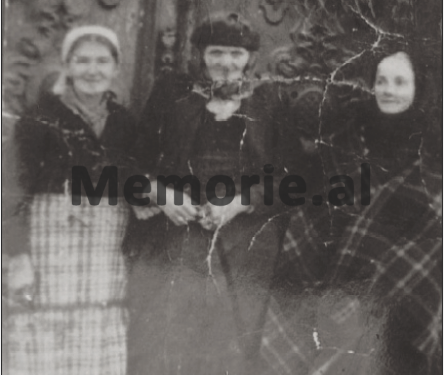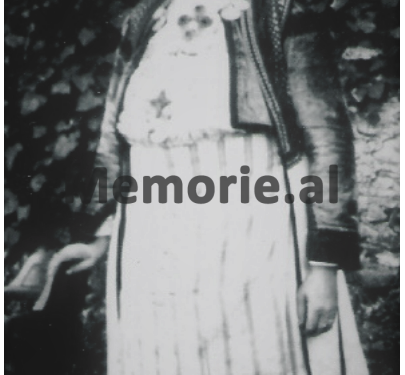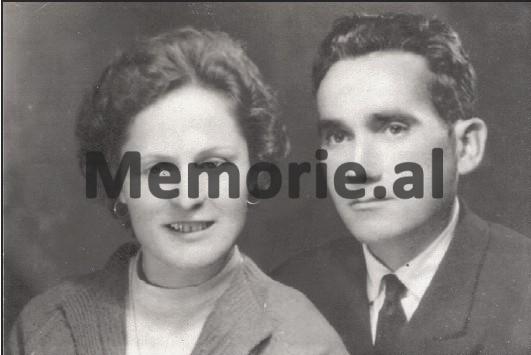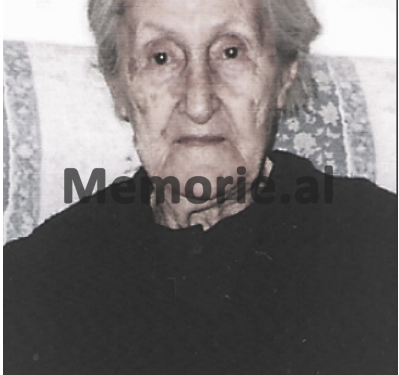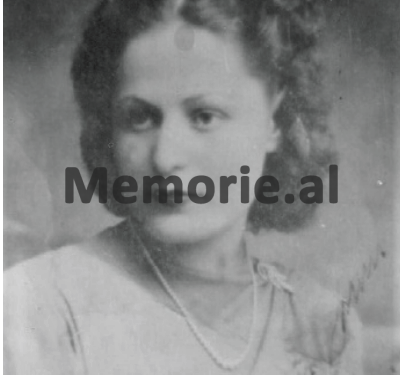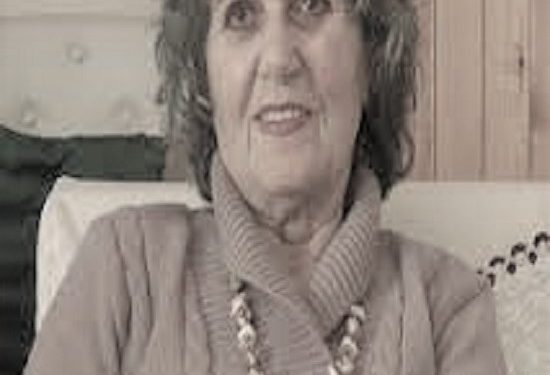Fatbardha Mulleti (Saraçi)
Part thirteen
Memorie.al publishes some parts from the book ‘Calvary of women in communist prisons’, by Fatbardha Mulleti Saraçi, (granddaughter of the famous former mayor of Tirana, Qazim Mulleti), whose family from 1944 until in 1991, he was persecuted by the communist regime of Enver Hoxha, where Fatbardha’s father, Haki Mulleti, a former senior state administration official since the 1920s, was imprisoned and interned by his family, until died in the hospital of Tirana, poisoned by the State Security. In her book ‘The Calvary of Women in Communist Prisons’, which is the fruit of several years of work, the author has masterfully described the unknown stories of some of the Albanian women and girls who suffered in prisons and internments in the dictatorial regime of Enver Hoxha, started by her mother, Pertefe Mulleti, and in turn: Marie Deda, Hajrie Kazazi, Kushe Seknej, Mrike Pali, Zyliha Rusi, Roza Jakova, Fatime Dilaveri, Hatixhe Pipa, Marije Gjoka, Angjelina Topalli, Hatixhe Kopliku, Nafije Kop Bushati, Budije Bushati, Adile Kazazi, Antonela Dostanishta, Nafije Stërmasi, Luçije Saraçi, Adile Meta, Qeuthere Meta, Feride Damnori, Vitore Ashta, Fetije Vuçiterni, Zehnije Gjylbegu, Xhyhere Kazazi, Luçije Malaj, Leadije Kazazi, Sadije Kazazi Hava Repishti, Luçije Kurti, Rukije Bushati, Shaqe Logoreci, Qamile Myftija, Marie Ndokëllia, Rozë Çefa, Çile Staku, Shaqe Marku, Lajde Arapi, Lutfije Barbullushi, Syme Muka, Zenepe Kraja, Fahrije Kazazi, Naxhije Plari, , Lizë Vukeli, Bade Kjaraj, Hava Baçi, Xhehadire Boriçi, Vitore Kalaj, Katerina Benusi, Sofije Baja, Lenë Pjetri, Dava Markagjoni, Mrika Markagjoni, Marta Gjonmarkaj, Bardha Gjon Markagjoni, Kristina Gjomarkaj, Çelestina Pervizarki, Kune Miraka, Sultana Dine, Vera Dine, Agime Dine, Hamide Çela, Vera Dine, Kadrije Cami, Sanije Sulaj, Meliha Sulaj, Vashe Kola, Prena Llesh Gjeçi, Gjystina Seku, Ilda Melgusha, Agime Pipa (Aranitasi), Terezina Pali, Liza Pali, Adile Boletini, Nasibe Kazazi, Ana Daja, Dila Zef Ndoja, Zyraka Mano, Shanisha Dosti, Zojë Gjeloshi, Drane Stakja, Elena Luli, Sabiha Kasimati, Marije Deda, Marije Shllaku, Biçe Pistulli, Sadije Kazazi, Gjyzepina Çoba, Marta Doda , Frida Satedini, Vitore Kuka, Gjela Llesh Biba, Bardha Cub Marku, Liza Llesh Mali, Bardha Mark Bushkola, Marije Tuci, Olimbi Baruti, Angje Kovaçi, Bedrije Ashikja, Musine Kokalari, Motër Gjeorgjina, Liljana Radovani, Laura Keqi, M Mrike Zadeja, Angjelina Shantoja, Naime Koçi, Sheriar Sefa, Vitore Shllaku, Liza Gjon Voci, Nina Shiroka, Laje Mehmeti (RRema), Feride Beshiri (Quku), Hasije Ulqinaku (Quku), Sofije Kali, Çile Gjush Larja, Nurfezo Koprencka, Sanije Gjylbegu, Emilja Shest Bregu, Vida Radovani, Nedrete Pipa, Motrat e Osman Kazazi, Safete Jusif Sokoli, Çiljeta Simoni, Lutfije Buashati, Sadije Bushati, Olga Schëeizer Libohova, Evelina e Ndoc Naraçi, Geraldina Apony-Zogu, Hilda Zyma. Marie Rafael, Zade Muka, Rukije Bushati, Hajrie Vrioni, Emine Gjyrezi, Xhemile Beqir Komi, Hedije Dume Repishti, Syme Muka, Fetije Vuçiterni, Sebije Puka, Marjeta Serreqi, Dhurata Sokoli, Klara Miraka (Merlika), Asi , Liri Cenaj, Rudina Dema, Adelajde Miraka, Drane Jakja, Syriha Hasi, Aishe Gogaj, Luçija Kaçaj, Gjyljana Malaj (Pervizi), Nadide Kasaruho, Nadire Kërçiku (Peshkëpia), Shpresa Ballolli (Merdani), Makbule Frashëri, Misly Çrash Dervishi (Leka), Natali Arkandi Rozengolc (Pengili), Vigelmina Vitalij Kovaleshko (Veshi), Rukije Rama, Tefta Tasi, Liri Lubonja, Kozara Kati, Shpresa Ngjela, Vera Bekteshi, etc.
Continued from the previous issue
Mrika Markagjoni
(1885-1968)
The wife of Gjon Markajoni, mother of ten children, among whom Marku and Sandri killed on the mountain, while Deda was taken as a soldier and imprisoned at the age of 22. He was sentenced to 5 years in prison, released, but without reaching his family, the young man was arrested and held for three years in solitary confinement by the State Security in Tirana.
The investigator was pressured for diversion, to send him with activity in the ranks of the Diaspora. They left him for 3 years without being left, without being fed, he was about to die, his body swelled and he was affected by severe anemia! Despite the torture, he remained strong and refused to become an accomplice, a tool of state security.
When they saw that the anemia had progressed greatly, they gave him food, then took him to court and sentenced him for the second time, seven years, ostensibly for attempting to escape. Throughout this period, the hearts of mothers and sisters suffered, not knowing where their son and brother were. How could the desolate mother sleep with this great pain that she did not know where her son was? Can any pen poet or writer write the trembling of her heart and the suffering of the mother’s soul? The figure of the mother (who was the greatest figure of mankind, as old as himself) had been insulted in an inconceivable way…!
Mother Mrikë’s son tried the prison of Shkodra, Tirana and all the camps: Beden, Maliqi, Orman Pojan, etc. He served his sentence in 1955, was released, but was sent straight into exile in Kuç, Kurvelesh, for a year and then interned in Savër, Lushnja.
Mrika Markagjoni
(1885-1968)
There was Mother Mrikë since 1945 without seeing her son. The internees from the Kurvelesh camp got out of the car and mother Mrikë asked:
– “Who is my grandfather?”
When she met her son she did not know him…! Her heart trembled, she was torn to pieces by her son’s sufferings, but she remained strong, strong as the tribe she was. How much longing, how much suffering!!!. They called the mother to the Internal Affairs Branch and said: “Tell me, where Markajjoni found them?” – And the mother answers: – “Look for them where there is never a table.”
This mother was a companion and saw how life went for her daughters, granddaughters and little 6-year-old grandson, who grew up in exile until the day she passed away in 1968. Another mother died in exile. While her son, Deda, remained interned until 1991. She remained without forming a family. A whole life of suffering and injustice. Mrs. Mrika was the daughter of Gjokë Pjetër Perviz – the cousin of Prenk Perviz and Gjok Pjetër Pervizit – whose brother, Gjini, was the leader of the Kurbin uprising and raised the flag in Milot on 28 November 1912.
With this marriage the friendship between their two tribes was strengthened. In addition to the suffering she suffered in her Gjomarkaj family, she suffered other losses in her parental family. His brother and seven grandchildren were killed during the communist dictatorship. Some died in prisons and camps, including children. With the family of Prenk Perviz’s cousin, she spent the rest of her life in internment camps until her death, in Savër, Lushnja, after 24 years of internment, at the age of 83.
Marta Gjonmarkaj
(1916 – 2006)
Daughter of John Mark. She was interned in 1945, along with her brother’s wife, Martha, who was paralyzed, as soon as her husband was killed. They sentenced Martha to 7 years in prison, for agitation and propaganda and allegedly keeping in touch with her brothers, that she allegedly had contact with those of the mountains?! (Surprisingly, being exiled, isolated, how he could meet those from the mountains?!) He spent his years in prison in Berat prison. 4 years.)
As soon as he finished prison, he was interned in the Tepelena camp. During the years of internment he worked in Berat, Tepelena, Vlora and worked in the brick factory in Tirana, in Kamza (working with pipes), in Lushnja in Savër (1953) and in the Gjazi sector (he was with his brother Deda), they had separated from the rest of the family, worked in agriculture.
He served his brother’s bride who was paralyzed for 30 years in a row. During the period he was in exile with his brother, Deda in Gjaz, he was arrested for the third time in 1977, the motivation was known, allegedly for agitation and propaganda, he was sentenced to 10 years, again prison, prison… in eternity, prison, communist prison.
Deda was released from the third prison, but again the big door of internment was opened (there was no door) in Gjaz (near Krutje), he was now with his sister Marta and nephew Gjon (who was only 6 years old when he was interned and increases in internment camps). Twice a day on appeal, morning and evening. They were released only in 1991. Freedom – did freedom come?? !!
Marta Gjonmarkaj
(1916 – 2006)
Bardha Gjon Markagjoni
(1925)
Daughter of John Mark. He continued the school of the Nuns in Shkodra, then the college in Italy. In 1943 he came for a vacation with his family in Shkodra. The borders were closed after the war and he remained in Albania, leaving his studies halfway. At the age of 20 in 1945 he was exiled. They kept him in the house of Guljem Suma (who had made him a prisoner), they were together with the families of Muharrem Bajraktari, Kole Bibë Mirakaj, Llesh Marashi. He was interned in Berat, sent to old houses, where he was given only a piece of bread to eat.
– “After a year we were sent to forced labor” – says Bardha – “to the olive groves of Berat and the farm of Kuçova. As a reward for the work they gave us only bread, while in Kuçova also a cauldron dish (which was more juice and herbs)”. – “We” – continues the story of the honorable Mrs. Bardha – we were politically persecuted, that the boys were with the anti-communist resistance. I was detained for 4 years in Berat, but here I was imprisoned. I was detained for 5 months, without an arrest warrant. I was kept tied to my legs, so as not to meet the other detainees, who were the beys of Berat. I was put in a pit, without light, then in a big room, alone, completely alone, while in the other rooms were the detainees of Sami Qeribashi’s group, who beat them every night, beating them incessantly and their screams I listened to them too… I saw with my own eyes how they were arrested without arrest warrants, the convicts were tortured, endless tortures, all kinds of things”.
– “I remember” – she continues – “we were isolated, Hamit Mufti was put in a crib (that is, a small room, inside the large room, without windows that served to place bedding such as: mattresses, quilts, etc.) while I was put under the stairs. The UNRRES disinfectant given to the prison for disinfection by parasitic insects was used by the guards as a means of torture. They disinfected the musk where they had put Hamit Mufti inside, closed his lids and left him under torture.
He was out of breath and so they left him all the time, whiles the other prisoner Tajfur Asantalen, who had been under torture for 11 months (he was 60 years old), had his hands tied so tightly that his wrists were infected. The doctor came to treat his wounds, but they had worms and the investigators told him: “- We told you that we will let the worms eat you”.
– “After many, many tortures, which cannot be described, that every day there was a new model of torture, the whole group of Sami Qeribashi was shot. Their bones were found by family members in 1991, in a shared pit, and the skeletons that were found were handcuffed. The day I got out of jail, I found Grandma Dava, who had just turned 90, who died in exile. I buried him in Berat, my brother’s wife, who walked with difficulty, helped me and later became completely paralyzed. “Grandma Dava lost her grave.”
The story of Bardha Markagjoni is full of many sufferings and surprises when you see him today, at the age of 80, who has a brilliant memory and keeps his body straight and the conversation with him sends you to those years full of endless suffering, especially for the layer that was classified by the red caste, declassified…
The story of the pain continues and I am telling it according to the conversation with Mrs. Bardha:
– “In 1949 we were sent to the Tepelena camp. We lived in silos up to 200 people, regardless of gender. The wind made the cold enter us to the marrow. We women loaded wood on our backs, which our sons had cut down on Mount Turan, and we women in charge went down to the field to supply the branch, the oven, and the families of the officers. Every day we climbed the mountain, then descended loaded. Hundreds of people died of starvation. In that period, in the camp, dysentery fell, many people died, especially with dozens and dozens of children. A mountaineer killed both twins. After this macabre story, we were given the kettle for food, which was just juice Zot God!!!
An event that impressed me was the accident that happened with the car that transported the internees in the direction of Tepelena, on the mountain of Këlcyra (year 1949). “Many were injured, but the most painful thing was that Fadil Petrela and Maje Kupi (husband and wife) died, while the three young children, who were in their aunt’s lap, were left orphans (the eldest 8 years old)”.
“While” – she says – “the driver and the police did not find anything!!”
– “While Zef Dajçi and his wife Roza were injured. Zefi remained paralyzed. Five years in Tepelena… which was every day with surprises and you had to face the cold to enter the marrow. In 1953, the internment in Savër continued, the work in agriculture, the appeal twice a day… In each transfer, we transported with vig the paralyzed, the brother’s bride, who remained like this for decades”.
– “In 1965” -says Mrs. Bardha- “I married Mr. Gjergj Bici (he had spent 20 years in political prison, worked in Bonifikim, in Tresh, Lezha).
I came to Milot. In the districts of Lushnje, Fier and Kruja I had the right to move without an appeal, I had a driving license. We settled in Milot. The man worked at the Mati Bridge. Ten years of marriage, I had no children, but in 1975 we were both arrested, convicted of agitation and propaganda. Witnesses were a man and a woman we had never met. We were sentenced to ten years in prison. I was 50 years old.
I was kept in solitary confinement for 11 months; we were not allowed to meet my family. All my clothes were confiscated. I spent the whole period with a skirt and a blouse (both in the summer and in the cold season). The food was cabbage soup (the only dish of the cauldron). I was taken to the Kosovo prison in Elbasan, and my husband to Ballsh in Fier. I worked 4 years on the farm, in agriculture. “After the age of 54, I did not go to work anymore, I stayed in prison.”
We lived in a cell of 75 prisoners (from the red caste was Asamble Kondi, Mira Bumçi and the Dume family). In prison the church Gjyljana Andrako (sister of Monsignor Ernest Çoba), was married to an Italian and had two sons. She was put in jail only because she had gone to the Italian consulate to withdraw her husband’s pension. He was sentenced to 18 years in prison (in 1975), while the eldest son was sentenced to 7 years, the other son was sent into exile.
In 1982 I was released from prison (pardoned), my sentence was reduced. In 1986 I was interned in Fishta (Zadrima – Lezha). There I found the family of Fadil Paçrami – Violeta and Todi Lubonja – Lirina. We did very well. I did 8 years of internment; my husband came to me, after finishing 10 years of the second prison. My husband, of endless suffering, came to me in 1985, but in 1986 he died. He came out of prison sick with lung cancer…
I was left alone in exile. I did not have other family members around. They were interned and imprisoned in other countries. In 1991 I came to Shkodra, as soon as the democratic movements began. I entered my parents’ house, with great difficulty I settled into a room. Then a new era began, that of union. After the persecution from 1945 to 1991, that is, after 46 years, we gathered the surviving family members.
During the conversation, I asked Ms. Bardha a question:
– “Mrs. Bardha, with all these mountains of suffering, what remained in your life, the most difficult camp?” – in fact, my voice trembled, because I remembered Reshit Mulleti, my uncle’s son, who had walked the same paths of suffering and persecution.
Mrs. Bardha answers me:
– “The strongest, the most difficult, was the extermination camp, that of Tepelena, which has no feat to describe it: children have died en masse, old people. Taking the dead out of the graves. Misery food. Animal treatment by police officers. Harsh climate, cold in the marrow, barefoot, naked. Life in the barracks was a torture in itself, at night we had no right to go out for personal needs. The darkness… and many, many other sufferings, endless… we rightly call Tepelena the extermination camp ”.
This is the life of the woman who began her suffering at the age of 20 and how her youthful dreams were mercilessly killed and her life went to prison and exile. Do you have anything to comfort this woman with when the communist system turned its revenge on the family and dealt with women, the elderly and children? Memorie.al




